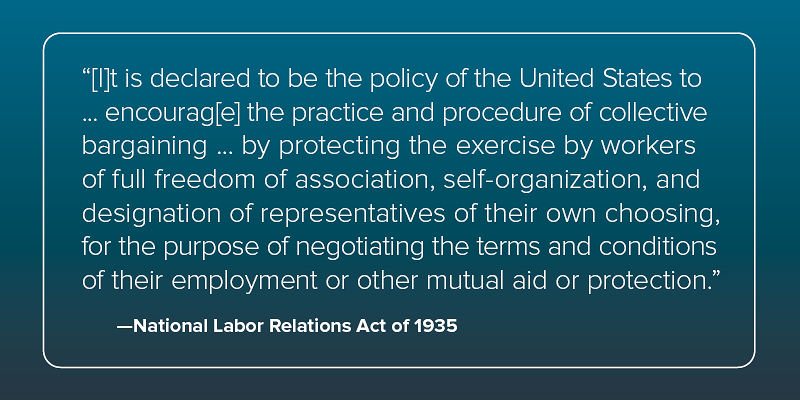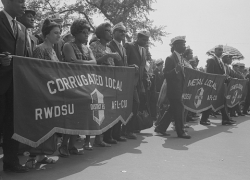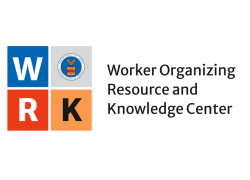
Today, the Office of Labor-Management Standards issued its Annual Report for Fiscal Year 2021. This is our 18th year publishing this report on our website, and the reporting process gives us an opportunity to reflect on the agency’s work and what that work says about the state of the labor movement’s democratic and financial integrity.
Before diving into the report’s conclusions, I want to say a word or two about the agency more broadly. The results in this report are the product of countless hours of work by a small band of dedicated public servants who care deeply about the integrity of the labor movement. For them, 2021 was a challenging year, but through hard work they were able to overcome the difficulties of the pandemic and accomplish the key goal of OLMS – assuring the public that the labor movement meets the standards of democratic governance and transparent financial integrity Americans expect.
Here is a brief overview of our 2021 report, by the numbers:
-
67: We achieved our goal of resolving all union election complaints within 67 days of our receipt of a complaint.
-
202: We completed 202 criminal investigations, meeting the goal we set for the agency.
-
221: We conducted 221 compliance audits, just shy of our goal of 237.
-
47: We began the year with 43 international and national unions participating in our Voluntary Compliance Partnership program, and added 4 more during the year.
-
97%: The percent of unions, employers, consultants and surety companies filing required reports electronically. Electronic filing is crucial to the transparency of our work. We easily surpassed our goal of 85%.
-
22: In 2021 there were 22 elections OLMS investigated that were rerun either as a result of a voluntary agreement (14) or court order (8).
Each OLMS Annual Report is a useful snapshot of the state of the democratic and financial integrity of the labor movement during the preceding year. Taken together, the OLMS Annual Reports show a comprehensive picture of thousands of unions and hundreds of thousands of union officers and employees following the law while fighting for the rights of workers in exactly the way Congress intended when it enacted the National Labor Relations Act in 1935.

This conclusion is supported by our annual reports’ data on union officer elections and criminal convictions. Between 2012 and 2021, the number of union officer elections rerun after violations of the Labor-Management Reporting and Disclosure Act averaged 24 of the roughly 7,000 elections held annually. In that same period, criminal convictions averaged 82 of the 200,000 plus union officers and employees each year, which is less than .04% of union officers and employees. In other words, the very few LMRDA violations that occurred are the exception that prove the rule – almost all unions and union officers and employees do their work faithfully without incident.
2022 is shaping up to be a challenging year as well, but OLMS will keep pushing forward. In addition to our ongoing enforcement efforts regarding union activities and filings, this year we have several new priorities:
-
Devoting time to ensuring that employers and consultants are fully complying with the LMRDA’s reporting requirements.
-
Reviewing federal transit grants to ensure that the grant recipients are respecting workers’ rights to bargain collectively – work that we expect will increase following the passage of President Biden’s Bipartisan Infrastructure Bill.
-
Relaunching a program highlighting the benefits of collective bargaining and cooperative union/employer bargaining relationships.
We look forward to continuing to advance the Office of Labor-Management Standards' critical mission in 2022 and beyond.
Read the full 2021 OLMS report here.
Jeffrey Freund is the director of the U.S. Department of Labor's Office of Labor-Management Standards.
Editor's note: This blog post was updated on Feb. 1 to incorporate FY21 data. It originally said, "Between 2011 and 2020, the number of union officer elections rerun after violations of the Labor-Management Reporting and Disclosure Act averaged 30 of the roughly 7,000 elections held annually. In that same 10 year period, criminal convictions averaged 37 of the 200,000 plus union officers and employees each year, which is less than .02% of union officers and employees." Additionally, the second bullet point at the top was updated to clarify that the goal set for criminal investigations is not based on past experience.

 U.S. Department of Labor Blog
U.S. Department of Labor Blog







